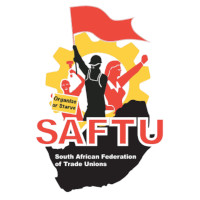The South African Federations of Trade Unions (SAFTU) has noted the form and character of the ongoing looting of shops, retailers, wholesales and cargo containers.
Having began as a demonstration demanding the release of former president, Jacob Zuma, the protests have three characteristics: the poor appropriating food, furniture and other goods, opportunistic thuggery by those who are well off and drive to warehouses with bakkies, and the criminal elements pursuing burning and destruction of infrastructure.
SAFTU condemns the burning of property, trucks and shopping centres.
The streak of burning trucks and shopping malls seems to be well orchestrated, and possibly, by Zuma supporters, who have warned of instability at the eventuality of Jacob Zuma’s incarceration.
However, that masses of poor people joined in the looting in parts of Kwa Zulu Natal and Gauteng, is not an automatic support for Jacob Zuma. Instead, that they have joined the looting is a symptom of the social crisis. The blame for the rising social crisis lies squarely on the shoulders of the ruling party, ANC, because of the economic path it has pursued since 1994.
That neoliberal economic path has excluded many from economic activity through unemployment, whilst perpetuating the socio-economic inequalities that widened a pool of poor masses.
Massive unemployment, widespread poverty and government’s indifference to the cries of the people for social relief grants (basic income grant) for the unemployed, precipitated this bomb whose explosion is apparent.
Many who joined the looting, have commented that their part in the looting was not about Zuma, but because they are unemployed and hungry. They care less about whether Zuma is freed or not. #FreeZuma campaign merely became a catalyst for the appropriation spree.
The deployment of the army may succeed in restoring calm. But this, will only kick the can down the road. Mass uprising of the poor is inevitable especially if mass unemployment remains. The only problem is that corrupt leaders in either faction of the ANC stand to exploit this condition.
Public services and public servants
The police have failed to stop looting and burning of trucks, shopping malls, retailers and wholesalers. Not because of incompetence, but simply because they were outnumbered and overwhelmed.
SAFTU and its affiliate, South African Policing Union (SAPU), have lamented the austerity cuts carried out by government across the public sector, especially in public policing.
These cuts are responsible for the lack of infrastructure development, lack of maintenance of police vehicles and filling of vacant posts on time. It is clear, that, a 160 000 police force is not enough to tend public order policing and attend to the criminal calls in violence-ridden working class communities.
Even under normal circumstances, the police force is unable to satisfactorily attend to people’s cases and calls for protection against criminals because they are understaffed. The Police National Commissioner Khetha Sithole has in the past pointed out that there is shortage of 60 000 police officials. Today society is paying a heavy price that the government prioritized austerity programmes and not the safety of the people.
The same goes to all departments responsible for provision of public services – lack of infrastructure development, inadequate procurement of working equipment and understaffed.
It is on this basis that SAFTU reiterates its call to the public servants not to sign the insult that is the public sector wage offer. The ruling party requires public servants to
be patriotic, meanwhile they are patriotic and loyal to the neoliberal policy frameworks that together with corruption, are responsible for the collapse of the public sector.






